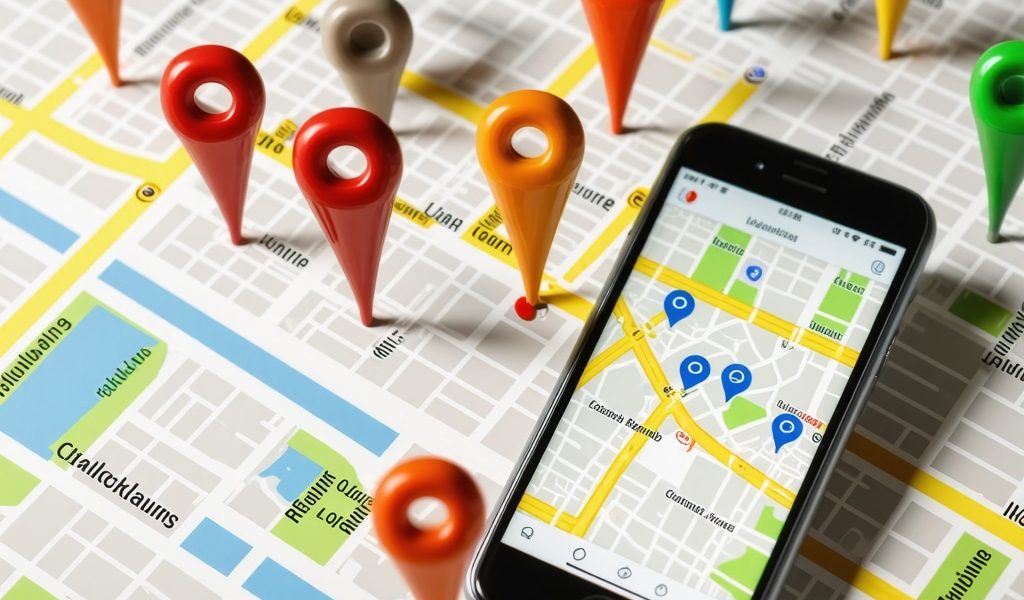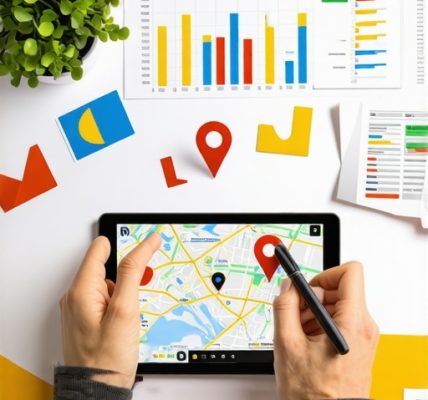Unlocking the Power of Google Maps SEO: Your Gateway to Local Customers
In today’s hyperlocal digital landscape, ranking in the coveted Local 3-Pack on Google Maps is a game-changer for small businesses aiming to dominate their neighborhood. But what does it truly take to get listed in this prime real estate of local search results? Beyond simple address listings and basic profiles, Google Maps SEO demands a sophisticated blend of strategic optimization, trust-building, and user engagement. This article dives deep into expert tactics that go beyond the basics, helping you understand how to elevate your Google Business Profile to secure and sustain that top-tier visibility.
Crafting an Irresistible Google Business Profile: The Art and Science of Optimization
At the heart of Google Maps SEO lies your Google Business Profile (GBP). But not all profiles are created equal. To get into the Local 3-Pack, your profile must be meticulously optimized with accurate, comprehensive data. This includes:
- Consistent NAP (Name, Address, Phone): Ensuring your business details are uniform across all platforms prevents confusion and strengthens Google’s trust in your listing.
- Strategic Category Selection: Choosing the right business categories that reflect your niche boosts relevance for local queries.
- Keyword-Infused Descriptions: Crafting natural, informative descriptions enriched with relevant local keywords that resonate with your target audience.
- Visual Content: High-quality, geo-tagged photos and videos that showcase your business environment and offerings enhance engagement and credibility.
Integrating these elements thoughtfully helps Google accurately categorize and rank your business, increasing chances to appear in the Local 3-Pack. For actionable insights on optimizing your profile, explore this comprehensive guide to Google Business listing optimization.
Building Local Credibility: Why Reviews and Citations Are Your Secret Weapons
Google’s algorithm for local search rankings heavily weighs your business’s reputation within the community. Positive customer reviews not only influence potential clients but also serve as powerful ranking signals. Encouraging authentic, detailed reviews and responding promptly can elevate your profile’s trustworthiness.
Equally important is citation management—consistent mentions of your business on authoritative local directories and niche-specific platforms. These citations reinforce your local relevance and trust. Managing them effectively can be complex but rewarding. For expert advice, refer to best practices for GMB citation management.
How Does Google Determine Which Businesses Make It Into the Local 3-Pack?
Google’s Local 3-Pack algorithm considers three primary factors: relevance, distance, and prominence. Relevance measures how well your listing matches the search query, distance assesses how close your business is to the searcher’s location, and prominence evaluates your overall reputation, including links, reviews, and offline presence. Businesses excelling in these areas, supported by a fully optimized Google Business Profile, stand the best chance of making it into the Local 3-Pack.
Leveraging Advanced Local SEO Tactics: Beyond the Basics
To truly dominate Google Maps SEO, integrate advanced strategies such as:
- Regular Content Updates: Posting timely updates, offers, and events on your GBP keeps your profile active and engaging.
- Local Link Building: Earning backlinks from local organizations, blogs, and news outlets enhances your authority.
- Utilizing Geo-Targeted Keywords: Incorporating neighborhood or city-specific phrases in your posts and descriptions captures hyperlocal traffic.
These nuanced tactics distinguish businesses that merely appear from those that thrive in local search results. Learn more about powerful local growth strategies in this expert resource on local business growth with GMB SEO tools.
Engage, Optimize, Repeat: A Call to Action for Local Business Owners
Are you ready to elevate your local presence and capture more customers through Google Maps? Start by auditing and enhancing your Google Business Profile, cultivating genuine reviews, and embedding strategic local SEO practices. Share your experiences or questions below to join a community dedicated to mastering Google Maps SEO and unlocking local search success!
For further expertise on ranking strategies and optimization tips, explore our detailed resources such as expert GMB ranking techniques.
Source: Moz Local SEO Guide — a leading authority in local search optimization and ranking factors (moz.com).
Harnessing the Power of Google Posts to Enhance Local Engagement
Google Posts offer a dynamic way to communicate directly with your local audience, providing timely updates, promotions, and news. These posts not only keep your Google Business Profile fresh but also influence your local SEO by signaling activity and relevance to Google’s algorithm. When crafting posts, incorporate geo-targeted keywords and clear calls to action to maximize user interaction and conversions.
Consistent posting schedules and varied content types—such as event announcements, product launches, or customer testimonials—can significantly boost visibility and engagement rates. For more on optimizing your Google Posts for SEO impact, check out our expert guide to GMB post optimization.
How Can Hyperlocal Content Elevate Your Google Maps SEO Strategy?
Focusing on hyperlocal content means tailoring your messaging to specific neighborhoods, landmarks, or community happenings. This precise targeting not only attracts a more engaged audience but also aligns with Google’s increasing emphasis on localized search intent. Integrating hyperlocal keywords within your Google Business Profile description, posts, and Q&A sections can dramatically improve your chances of appearing in “near me” searches.
For example, a bakery in Brooklyn might highlight “freshly baked goods in Williamsburg” or “Brooklyn artisan breads,” creating a strong local connection. This approach requires ongoing research into local trends and keywords, which can be facilitated by tools like Google Keyword Planner and local SEO analytics platforms.
Leveraging Local Backlinks: Building Authority Within Your Community
Beyond citations and on-page optimization, acquiring backlinks from reputable local websites enhances your business’s prominence and trustworthiness. Partnering with local chambers of commerce, sponsoring events, or contributing guest posts to community blogs are effective tactics. Such backlinks not only drive referral traffic but also bolster your Google Maps ranking by signaling local authority.
Remember, the quality of backlinks matters more than quantity. Focus on obtaining links from domains with strong local relevance and engagement. To deepen your backlink strategy, explore our comprehensive guide on GMB backlink building.
Implementing Advanced Analytics: Measuring and Refining Your Local SEO Efforts
Effective Google Maps SEO is an iterative process, requiring continuous monitoring and adjustment. Leveraging tools like Google Analytics and Google Search Console enables you to track traffic sources, user engagement, and conversion paths specific to your local audience. Additionally, specialized local SEO platforms can provide insights into your rankings within the Local 3-Pack, competitor analysis, and citation health.
Analyzing this data helps identify which keywords and strategies yield the highest ROI, allowing you to refine your content, posting frequency, and backlink outreach accordingly. Staying proactive with analytics ensures sustained growth and adaptation to evolving local search algorithms.
How Can Small Businesses Overcome Common Challenges in Mastering Google Maps SEO?
Small businesses often face hurdles such as limited resources, inconsistent NAP data, or managing multiple locations. Overcoming these requires strategic prioritization—focusing first on core listings, standardizing information, and leveraging automation tools for citation management and review monitoring. Collaborating with local SEO experts or agencies can also provide tailored solutions and time-efficient execution.
Moreover, addressing negative reviews promptly and transparently builds trust and demonstrates commitment to customer satisfaction, which positively influences your local ranking.
By methodically tackling these challenges, small businesses can unlock the full potential of Google Maps SEO and thrive amidst competition.
According to the Moz Local SEO Guide, businesses that actively manage their local SEO signals, including citations and reviews, enjoy significantly better visibility and customer engagement.
Ready to refine your Google Business Profile and dominate local search? Share your experiences or ask questions in the comments below, and explore more advanced techniques to elevate your local SEO game.
Decoding Local User Behavior: Advanced Analytics for Google Maps SEO Success
Understanding how local users engage with your Google Business Profile is paramount to refining your SEO strategy. While basic metrics like clicks and calls offer insights, diving deeper into behavioral analytics reveals nuanced user patterns that can inform targeted optimizations. For instance, analyzing the “Customer Actions” report in Google My Business provides granular data on how visitors interact—whether they request directions, visit your website, or call directly. This level of detail allows businesses to tailor their content and outreach to the most valuable user interactions.
Additionally, integrating Google Analytics with UTM parameters on your Google Posts and website links enables tracking of traffic sources with precision. This data empowers marketers to assess which local campaigns or posts generate the highest engagement and conversion rates, facilitating data-driven decisions that maximize ROI.
What Are the Most Effective KPIs for Monitoring Google Maps SEO Performance?
Key Performance Indicators (KPIs) for Google Maps SEO extend beyond the obvious metrics. While impressions and click-through rates remain essential, advanced KPIs include:
- Conversion Rate from Map Searches: Percentage of users who take a desired action after finding your business via Google Maps.
- Local Search Ranking Fluctuations: Tracking positional changes in the Local 3-Pack over time to gauge SEO health.
- Review Velocity: The frequency and recency of new customer reviews, which correlate with ranking improvements and customer trust.
- Engagement with Google Posts: Monitoring interactions such as clicks and shares to measure content effectiveness.
Utilizing these KPIs in combination allows businesses to paint a comprehensive picture of their local search health and identify areas requiring refinement.
Harnessing Competitive Analysis Tools: Gaining Local Market Intelligence to Outrank Rivals
To outperform competitors in Google Maps SEO, leveraging specialized local SEO tools is indispensable. Platforms like BrightLocal, Whitespark, and SEMrush offer competitive insights including citation gaps, backlink profiles, and keyword ranking comparisons. By analyzing competitor strategies, businesses can identify missed opportunities such as unclaimed directories or neglected keywords, enabling targeted efforts that close gaps and expand their local footprint.
Moreover, competitor review analysis reveals customer sentiment trends, highlighting service or product areas where your business can excel and differentiate. This intelligence-driven approach transforms local SEO from guesswork into a strategic advantage.
Optimizing for Voice and Mobile Local Searches: The Next Frontier in Google Maps SEO
With the proliferation of voice-activated devices and mobile searches, local SEO must adapt to conversational queries and mobile user behaviors. Voice searches tend to be longer and more natural language-driven, often incorporating question phrases like “near me” or “open now.” Optimizing your Google Business Profile and content for these queries involves incorporating natural language keywords and maintaining up-to-date business hours and FAQs.
Mobile optimization also entails ensuring fast-loading, mobile-friendly websites linked from your GBP, as Google prioritizes user experience in its rankings. Additionally, enabling click-to-call buttons and streamlined navigation enhances mobile user engagement, directly impacting local search success.
Why Is Schema Markup Crucial for Enhancing Google Maps Visibility?
Schema markup—structured data embedded in your website’s HTML—provides search engines with explicit clues about your business details, such as address, hours, and reviews. Implementing LocalBusiness schema enhances Google’s ability to display rich snippets and accurate information directly in search results and maps, leading to higher click-through rates and improved user trust.
For example, adding schema for events or special offers can make your listings more interactive and appealing, increasing local engagement. The Google Developers guide on LocalBusiness schema offers comprehensive instructions for implementation.
Source: Google Developers – Structured Data for Local Business (developers.google.com).
Invitation to Deepen Your Local SEO Expertise
Ready to elevate your Google Maps SEO to new heights with data-driven insights and competitive strategies? Dive into advanced analytics, harness cutting-edge tools, and refine your mobile and voice search optimizations. Engage with our expert community by sharing your challenges or successes in the comments below, and explore our extensive resources for mastering local SEO nuances.
Integrating AI and Machine Learning to Revolutionize Local SEO
The advent of artificial intelligence and machine learning has ushered in a paradigm shift in how local SEO strategies are conceived and executed. By leveraging AI-powered tools, businesses can automate the analysis of vast datasets—ranging from keyword trends to user engagement metrics—to uncover nuanced patterns and opportunities that manual audits might overlook. Machine learning algorithms enable predictive modeling for consumer behavior, helping local businesses anticipate shifts in search intent and adapt their Google Business Profiles proactively.
For instance, platforms utilizing AI can dynamically optimize your GBP content, suggesting geo-targeted keywords and posting schedules aligned with peak local search demand. This intelligent automation not only enhances efficiency but also fosters continuous optimization that aligns with Google’s evolving ranking factors.
Exploring the Role of Augmented Reality in Enhancing Local Search Experiences
Augmented Reality (AR) is an emerging frontier intersecting with local SEO, offering immersive engagement opportunities. AR-enabled Google Maps features allow users to visualize businesses in real-world contexts via their mobile devices, enriching the discovery process. Forward-thinking local businesses can capitalize on AR by integrating virtual tours, interactive product demos, or location-based AR promotions within their Google Business Profiles.
This experiential layer not only differentiates a business in saturated markets but also amplifies user dwell time and satisfaction—metrics increasingly weighted by local search algorithms.
How Can AI-Powered Sentiment Analysis Enhance Review Management for Local Businesses?
AI-driven sentiment analysis tools dissect customer reviews to identify underlying emotions and trends beyond simple star ratings. This granular insight enables local businesses to detect recurring issues, positive highlights, and emerging customer expectations with unprecedented precision. By proactively addressing negative feedback themes and reinforcing praised attributes, businesses can refine their service quality and strategically respond to reviews, thereby strengthening their local reputation.
Moreover, sentiment analysis can prioritize review responses, ensuring timely engagement with critical feedback that impacts SEO performance and customer trust.
Leading platforms like SEMrush incorporate such AI capabilities, empowering local marketers with actionable intelligence to fine-tune their Google Maps SEO strategies.
Bridging Data Privacy and Local SEO: Navigating Compliance Without Compromise
With increasing regulatory scrutiny around user data, local businesses must balance effective SEO tactics with stringent privacy compliance. Implementing transparent data collection practices within Google Business Profile interactions and website integrations fosters consumer trust and aligns with frameworks such as GDPR and CCPA. Advanced local SEO practitioners employ privacy-centric analytics solutions that anonymize user data while maintaining actionable insights.
Adopting these practices ensures sustainable SEO growth and mitigates risks associated with data breaches or regulatory penalties, safeguarding local brand integrity.
Disruptive Innovations: Voice Assistants and AI Chatbots in Local Customer Engagement
Voice assistants like Google Assistant and AI chatbots integrated with Google Business Profiles represent cutting-edge tools for enhancing customer interaction. These technologies facilitate real-time, conversational engagement, enabling users to obtain business information, make bookings, or receive personalized recommendations seamlessly. Optimizing your GBP to support voice queries and chatbot integrations can substantially elevate local user experience and conversion rates.
Furthermore, analyzing chatbot interactions provides a treasure trove of data on user intent and pain points, informing continuous SEO refinements.
Ready to harness AI-driven strategies and emerging technologies to redefine your local SEO success? Engage with our expert community or explore our comprehensive advanced guides to stay ahead in the competitive Google Maps landscape.
Frequently Asked Questions (FAQ)
What is the Local 3-Pack, and why is it important for local businesses?
The Local 3-Pack is a prominent section in Google search results displaying the top three local business listings relevant to a user’s query. Securing a spot here dramatically increases visibility and click-through rates, making it a critical goal for businesses targeting local customers.
How do reviews influence my Google Maps ranking and customer trust?
Reviews are a pivotal ranking factor for Google Maps SEO. Positive, authentic reviews enhance your business’s prominence and credibility both algorithmically and in the eyes of potential customers. Promptly responding to reviews also signals active engagement, further boosting your profile’s trustworthiness.
What strategies can I use to optimize my Google Business Profile effectively?
Effective optimization involves consistent NAP data, selecting relevant and specific categories, integrating geo-targeted keywords into your business description, and regularly updating high-quality visual content. Additionally, leveraging Google Posts and maintaining active engagement through timely updates can enhance your profile’s relevance.
How can small businesses overcome challenges like limited resources and multiple locations in Google Maps SEO?
Prioritizing core locations, standardizing business information, utilizing automation tools for citation and review management, and collaborating with local SEO specialists can streamline efforts. Addressing negative feedback transparently also helps maintain a positive reputation despite resource constraints.
Why is schema markup critical for local SEO and Google Maps visibility?
Schema markup provides structured data that helps search engines better understand your business details, enabling rich snippets and improved search result features. This enhances your listing’s appeal and accuracy, which can translate into higher user engagement and improved local ranking.
How do AI and machine learning technologies impact Google Maps SEO strategies?
AI-powered tools analyze large datasets to identify keyword trends, user behavior, and optimal posting schedules. Machine learning enables predictive insights that allow businesses to adapt proactively to changing search algorithms, driving continuous and data-driven optimization of Google Business Profiles.
What role does hyperlocal content play in improving local search rankings?
Hyperlocal content targets specific neighborhoods or community landmarks, aligning closely with user search intent and Google’s emphasis on local relevance. Incorporating such content in descriptions, posts, and Q&A sections increases the likelihood of appearing in “near me” and localized searches.
How can I measure the effectiveness of my Google Maps SEO efforts?
Tracking KPIs such as Local 3-Pack ranking fluctuations, conversion rates from map searches, review velocity, and engagement metrics on Google Posts provides a comprehensive view. Using tools like Google Analytics, Search Console, and specialized local SEO platforms enables informed, data-driven refinements.
What are effective ways to build local backlinks for better prominence?
Engaging with local chambers of commerce, sponsoring community events, contributing guest articles to reputable local blogs, and earning mentions on authoritative local directories all contribute high-quality backlinks. These links enhance your domain authority and signal local trustworthiness to search engines.
How do voice and mobile searches influence Google Maps SEO optimization?
Voice and mobile searches often use conversational, longer queries with local intent (e.g., “open now,” “near me”). Optimizing for these requires natural language keyword integration, mobile-friendly website design, accurate business hours, and features like click-to-call to improve user experience and rankings.
Trusted External Sources
- Moz Local SEO Guide (moz.com): A comprehensive resource detailing local SEO fundamentals and ranking factors, essential for understanding Google’s local search mechanisms.
- Google Developers – Structured Data for Local Business (developers.google.com): Offers authoritative guidance on implementing schema markup, crucial for enhancing local search visibility.
- BrightLocal (brightlocal.com): Provides local SEO tools and extensive research on citations, backlinks, and local search rankings, valuable for competitive analysis and citation management.
- SEMrush Local SEO Toolkit (semrush.com): An AI-powered platform offering insights into keyword trends, competitor backlink profiles, and sentiment analysis to refine local SEO strategies.
- Google My Business Help Center (support.google.com): Official documentation and best practices for managing Google Business Profiles effectively.
Conclusion
Mastering Google Maps SEO requires a multifaceted approach that combines precise profile optimization, active reputation management, strategic local content creation, and embracing emerging technologies like AI and augmented reality. By focusing on consistent NAP data, leveraging hyperlocal keywords, cultivating genuine reviews, and monitoring advanced KPIs, businesses can secure coveted Local 3-Pack placements and sustain competitive advantage. The integration of voice search optimization, schema markup, and local backlinks further solidifies a business’s prominence in local search landscapes.
As the local search ecosystem evolves, staying informed through trusted sources and adopting innovative tools is essential to maintain and enhance visibility. We encourage you to apply these expert strategies, engage with your community through Google Posts, and continually refine your approach using data-driven insights.
Take the next step: share your Google Maps SEO experiences, ask questions, or explore our advanced guides to unlock your business’s full local potential.




I found this post incredibly insightful, especially the emphasis on maintaining a meticulously optimized Google Business Profile (GBP). From my experience running a small café, consistent NAP data was a real game-changer — once we ensured our name, address, and phone number were uniform across all platforms, our local search rankings noticeably improved. Additionally, incorporating hyperlocal keywords in our descriptions and Google Posts helped attract a more engaged neighborhood crowd rather than just broad city searches. However, one challenge I encountered was managing the influx of reviews effectively without overwhelming my small team. I’ve started using sentiment analysis tools recommended here to prioritize responses to more critical feedback, which has enhanced our customer trust and engagement. I’m curious how others handle balancing timely review responses and content updates when resources are limited? Also, have any local businesses seen tangible benefits specifically from leveraging voice search optimization or augmented reality integrations in their Google Maps SEO efforts? Would love to hear about different strategies and their outcomes!